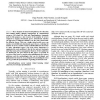Free Online Productivity Tools
i2Speak
i2Symbol
i2OCR
iTex2Img
iWeb2Print
iWeb2Shot
i2Type
iPdf2Split
iPdf2Merge
i2Bopomofo
i2Arabic
i2Style
i2Image
i2PDF
iLatex2Rtf
Sci2ools
156
click to vote
VSGAMES
2010
2010
Privacy Challenges and Methods for Virtual Classrooms in Second Life Grid and OpenSimulator
—Mass adoption of virtual world platforms for education and training implies efficient management of computational resources. In Second Life Grid and OpenSimulator, commonly used for this purpose, a key resource is the number of servers required to support educational spaces. Educational activities can take place at different altitudes over the same virtual land, for different classes. This way a single virtual world server can sustain several different educational spaces/classes, reducing the number of servers needed to make available different classrooms or other educational spaces. One issue whose importance is emphasized in such conditions is that of class privacy, bearing in mind that most privacy-management features of these platforms are land-based, not space-based. In this paper, we provide an overview of the issues to consider when planning privacy in these platforms and the methodologies that can be developed and implemented to ensure it at an adequate level, including the ...
| Added | 31 Jan 2011 |
| Updated | 31 Jan 2011 |
| Type | Journal |
| Year | 2010 |
| Where | VSGAMES |
| Authors | Andreas Vilela, Marcio Cardoso, Daniel Martins, Arnaldo Santos, Lucia Moreira, Hugo Paredes, Paulo Martins, Leonel Morgado |
Comments (0)

